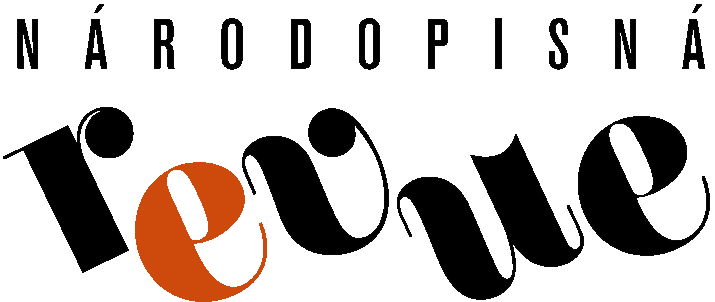Journal of Ethnology 3/2018 opens the theme “Transformation of Society and Culture after Formation of the New State”. Within a broader historical context, Michal Pavlásek focusses on the research into the adaption of Czech immigrants to Banat, particularly in the Serbian location of Veliké Srediště (From the Czech Lands to South-Eastern Europe: A Case Study to Overcome the Discontinuity). Jana Nosková deals with the theme of homeland at the inhabitants of German origin and their descendants who have remained in the Czech borderland even after the forced expatriation – displacement – of German ethic group after World War II (Heimat is Heimat?: “Homeland” As a Theme in the Memory of German Inhabitants who Have Remained in the Czech Lands). In his study, Martin Soukup presents Papua-New Guinea in its development from a colonial state to its official independence (“Let’s Rise Up, Sons of this Country“: Social Transformations in Papua-New Guinea after Independence). Martin Štoll submits an evaluation of essential societal themes at the time of dissolution of Czechoslovakia and formation of the Czech Republic (1992–1996) based on a documentary series produced by the FEBIO movie company (The EYE – the Look at the (Then) Present. Thirty-two hours of author´s witness to the Czech society in the new state). Out of the principal theme, the study by Serbian ethnologist Miroslava Lukić Krstanović is included, which deals with humanitarian actions in Serbia and the role that mass media played in the formation of public opinion in the realms of perception and value systems (Humanitarian Action, Solidarity and the Market of Interest in Serbia: The media discourse).
The Transforming Tradition column publishes a feuilleton The Force of Tradition, which is contemplation about cultural heritage in present-day society (written by Josef Holcman). Review Section remembers seventy years from the death of the reporter Egon Erwin Kisch (written by Oldřich Kašpar) and the formation of the Czech and Slovak CIOFF Section (written by Josef Jančář). Interview Section writes about the anniversary of the ethnologist Hana Dvořáková (born 1948). Social Chronicle remembers the anniversaries of the ethnomusicologist Dušan Holý (born 1933) and ethnologist Vlasta Ondrušová (born 1948), and it publishes an obituary for the Slovak ethnologist Zuzana Profantová (1953–2018). Further regular columns inform about exhibitions, festivals and new books.
From the Czech Lands to South-Eastern Europe: A Case Study to Overcome the Discontinuity
The study reflects adaptation and economical working mechanisms of a selected religious community of expatriates (reformed Evangelists who came from south-eastern Moravia) that in the mid-19th century settled in the multiethnic village of Velké Srediště in current Serbian Banat. The migration of monitored colonists from Central Europe was associated with the process of overcoming the moment of discontinuity (leaving the place of origin) through their adaptation in the new settings. The text presents institutional mechanisms that were used by the newcomers to overcome the stage of discontinuity, which brought doubts on the future life in the new settings. Based on written sources we assume a thesis that this social group brought a functioning social organization from Moravia to southern Hungary – an autonomous congregation community with own standards, forms of farming, confessional school and family religious education. The follow-up to the pre-migration model of a religious organization translocated by migration participants was based on the fact that it was time-honoured, tested and functioning. Through examples of several practices of this adopted model I argue that this was a social practice which significantly facilitated and accelerated the process of gradual adaptation in the new settings.
„Heimat is Heimat“: “Homeland” As a Theme in the Memory of German Inhabitants who Have Remained in the Czech Lands
The Czech lands‘ borderland underwent an essential social and cultural transformation between 1945–1946, which was determined by expatriation of most inhabitants of the German origin, as well as by new arrivals, formation of the “Iron Curtain”, and socialization of agriculture. In the public discourse, an image about uprooted borderland was created after 1989. The study deals with how the homeland is thematised by inhabitants of the German origin and their descendants, who were allowed to stay in the Czech lands‘ borderland after 1945/1946 but whose all lived world significantly changed after 1945. The empiric materials includes interviews with eight persons, made using the method of oral history. The author divides the narration about homeland into three groups (according to the time, space, and social and cultural sphere), and as an independent category she sorts out the narrations in which the relation to homeland is compared between those who have remained, and those who had to leave. The author also asks whether it is possible to use the narration about homeland, the “Heimat” concept, for an analysis, which she confirms. The analysis of the material shows that the “homeland” is mostly thematised in connection with its social and cultural components, and that it is most suitable to use the term “displacement” to interpret the narratives.
“Let’s Rise Ups Sons of this Country“: Social Transformations in Papua-New Guinea after Independence
The study focuses on the analysis of social political and economical transformations in connection with the decolonization of the former Territory of Papua and New Guinea. The study core includes an analysis of colonial arrangements and its influence on the transformation of society at the time before the independence and after the formation of the independent state of Papua-New Guinea. Special attention is paid to the analysis of the formation of elites and working classes within the former equalitarian communities, the blending of original, i.e. Big-Man systems with politics, and the influence of monetary economics on the former systems of socio-political ceremonial exchanges. The author documents how the colonial arrangement influenced the segmented ethnic identity of the inhabitants in the state of Papua-New Guinea, which the author understands as a vertical scale of ethnic consciousness. In the case of Papua- New Guinea the author shows that ethnic identity is divided into four levels: the country, the provincial, the territorial and the national one. Simultaneously, the author documents that in addition to the vertical division, also the horizontal division developed in the new state, which is result of the commencement of monetary economics.
The EYE – the Look at the Present (of that time): 37 hours of documentary film reflection of new Czech state society
Between 4th April 1992 and 17th December 1996, Czech Television presented 112 parts of the documentary series called The EYE – a Look at the Present-Day. It was made by the then newly established FEBIO production company owned by Fero Fenič. This project was the first systematic activity after 1989 to map the situation of the transforming Czech society and to catch its ongoing state, using audio-visual means. If each of the part was 20 minutes long, the total series amounted to 2 240 minutes, i.e. more than 37 hours of a pure author´s reflexion of the then social phenomena; it is not only a “bank” including the phenomena themselves, but even possible approaches to them. The study verifies whether and by which means the series reached the level of complexity in the thematic realm, and which dimension the author´s creative approaches and selected processes of expression brought to this unit, which is part of archive materials today. The author researches that part using a new concept of “key situation”, which help define the “form of authorship” that is essential for the impression of the theme.
Humanitarian action, solidarity and the market of interest in Serbia: The media discourse
The codification of humanitarian action and humanitarian aid in Serbia belongs to the broader area of social politics and the civil sector, which are shaped under the influence of social, economic and political circumstances. The main analytical vein in this paper was focused on decyphering the ambivalent face of humanitarianism or rather humanitarian practices, which stem from concrete social, economic and political circumstances in Serbia. One of the social playgrounds of humanitarianism is the media, which is an important transmitter of the message and shapes public opinion in the zones of perception and value systems. This is why humanitarianism is placed in the narrative discourse of the media as a case study. The analysis is based on a fundamental question – how do personal stories of poverty and illness get constructed as humanitarian stories as social problems? The research is based on the analysis of newspaper articles shaped into narrative mechanisms in order to construct “subsequent” realities with which people identify.



